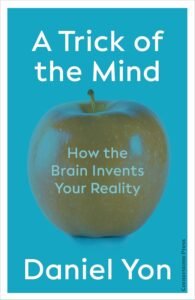A Trick Of The Mind by Daniel Yon (book review).
As a creative, I tend to be unique, exploring what makes me tick. Other creatives tend to avoid this because they are afraid they would lose their knack. As I’ve pointed out in the past, I used to assume that everyone was probably as creative as me and just didn’t use it, and then finding out they weren’t even close was a shocker. Hence, I have an interest in understanding the differences.
Daniel Yon’s book, ‘A Trick Of The Mind’, focuses on how the brain perceives and interprets the world through its senses, often filling in gaps in odd ways when the evidence is not there. He uses the classic example of mishearing song lyrics as one of these. Considering we all make the same mistake, it does tend to make me think we have similar interpretative problems or problems adapting to other people’s voices.
Some areas make a lot of sense in how we are swayed by other people’s beliefs. I was interested in his thoughts on empathy, but it’s not even mentioned in the index but is in chapter three. Although Yon explores autistics who lack the ability, he doesn’t look at the opposite extreme of clinical empathy, where emotional contact quickly shares another person’s emotions. Maybe it’s just the scientist in me, but you do have to look at both sides’ extremes, and to ignore one leaves it wide open for biasness or lack of research. I should point out that this book does not carry a detailed biography of Daniel Yon himself to put his qualifications in perspective, although it is in the Penguin website link. I looked him up; he is qualified in behaviour patterns. However, a lot of this book addresses the research by his fellow behaviourists at university rather than any he did. Something which I thought would be important in any book.
When he compares how people make associations with knowledge and tastes, I think I still differ from him. Then again, I don’t make such assumptions without proof. You can be interested in something without it having anything to do with other parts of your life. That doesn’t mean it can’t sway your thinking. Vegans and vegetarians tend to avoid fiction associated with meat, for instance.
Something Yon makes a good point about is how someone who is good at one thing is then expected to be good at other things. He makes a good point that it is not so and how experts in one field have little knowledge in other things. Apply that, and you have many examples. I’m less sure why it works that way with people, and I’m not even sure Yon has an answer to that because it’s a common problem for many people. In many respects, especially in the sciences, you really do need scientists to see the bigger picture.
His examination of how ventriloquists work and how your head centres on the one thing in front of you moving its lips is probably more telling about how your brain works, although I have to confess I do tend to watch both heads in front of me. What helps a good ventriloquist is remembering distance gives a different tone. Those who throw voices coming out of suitcases make their thrown voices quieter because they’re speaking through a closed box when I can’t spot the asterisk to what it is referring to. At least he’s not putting the footnotes at the back of the book. He makes a good reason why we feel compelled to read footnotes, although I tend to feel more frustrated. Oddly, the notes at the back of the book are for source reference. When I realised that, long practice has made me ignore them unless I want to check that.
In the chapter ‘Wanderlust’, Yon makes a point about Aristotle dividing things into two choices. It’s a shame General Semantics has been disregarded today because, if nothing else, it did push for multi-choice answers in thinking.
In the chapter on ‘Originality’, Wu does make a point that the AI-driven LaMDA has read many books but never says how much it actually understood or when that started happening.
The last chapter, ‘Paradigm Shifts’, focuses on meta-thinking. Basically, you’re looking at your own process of choice. Yon focuses on Americans in this, which probably means he’s aiming for that audience or he thinks they’re less balanced. One thing I wish he had included is the fact that 25% of Americans think the Earth is flat or their general knowledge, especially reading ORA online about the poor teaching standards, especially in regard to history and geography, that are running through their society. Poor choices are bound to come from poor information and general knowledge.
The size of this review and my arguing on a lot of points should not deter you from buying this book. In fact, this does give it a reason to read it because it is doing its job in making you think. The human mind isn’t a complete sponge, absorbing information without questioning. Oddly, that got me in trouble at college 50 years ago, but things have changed drastically since then. If you want to learn about what makes your brain tick and be manipulated, then this is a good place to start.
GF Willmetts
September 2025
(pub: Popular Science/Penguin, 2025. 276 page indexed enlarged paperback. Price: £16.99 (UK). ISBN: 978-1-529-90007-1).
check out website: www.penguin.co.uk/books/451515/a-trick-of-the-mind-by-yon-daniel/9781529900064


